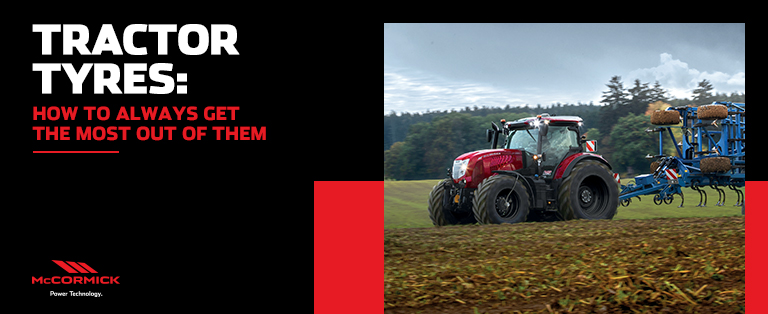TRACTOR TYRES: HOW TO ALWAYS GET THE MOST OUT OF THEM

Table of contents:
Tyres are a major investment to be thoroughly evaluated
Buying a tractor is a medium- or long-term investment that can potentially be very profitable if the machine is managed properly, with regular and proper maintenance. The same applies to one specific component, which is essential to the performance of the tractor as a whole: the tyres.
Unlike car tyres, tractor tyres have specific characteristics that require special maintenance procedures. They must be used with great care, as the tractor’s performance, and therefore the quantity and quality of the agricultural production, depend on them.
In short, tyre maintenance and use can have a major impact on a farm’s profitability, so it is important to be familiar with these aspects.
Tyre pressure: a decisive variable
Perhaps the most important characteristic of tyres is their pressure. An excessive or insufficient pressure level can have specific consequences for the tyre, thus affecting the tractor’s performance.
In general, it is good to keep in mind that there is no such thing as a pressure level that’s suitable for all conditions and for every type of surface. In fact, it is recommended to adjust the tyre pressure based on the type of terrain upon which you will be working.
If you have a centralised system, like in the case of the McCormick models equipped with the EazyGrip system, this operation is extremely quick and easy. Conveniently operated from the Data Screen Manager, this system sets the desired pressure, and stops automatically when the pre-set level is reached, thus reducing soil compaction, fuel consumption, and tyre wear, while at the same time optimising soil productivity.
When driving on roadways and asphalt, which are harder and more abrasive by nature, it is generally recommended to maintain a higher pressure level, as this will prevent excessive wear on the tyre. Be careful, however, not to over-inflate the tyres, as this will have the opposite effect. In fact, an over-inflated tyre will have a convex shape, resulting in a smaller contact surface and increased wear at the centre of the tread.
Tyre pressure is extremely important, and McCormick’s technical support can help you manage it in the best possible manner!
Actual use: another variable to be considered
As we’ve said, tyre pressure is a key aspect to be monitored, but it is also important to consider the actual use we make of the tractor, and therefore its tyres.
A set of tyres that are designed and manufactured for use in the field will naturally be subjected to greater wear when used also for other applications (road, forest, quarry work, etc.). In fact, there are various environmental factors that can have a negative impact on tyres:
- Road surfaces and course terrain: the abrasive effects of asphalt can be counteracted by driving at lower speeds
- Forest obstacles: sharp stones and branches, stumps, and many other elements of the forest environment are some of the most frequent causes of rapid tyre wear
- Farm work: heavy-duty use of the tractor in the farmyard can entail excessive manoeuvring.
In the end, there are various precautions that can be taken to prevent premature tyre damage, and McCormick can help you with this thanks to its quality support and spare parts services!
